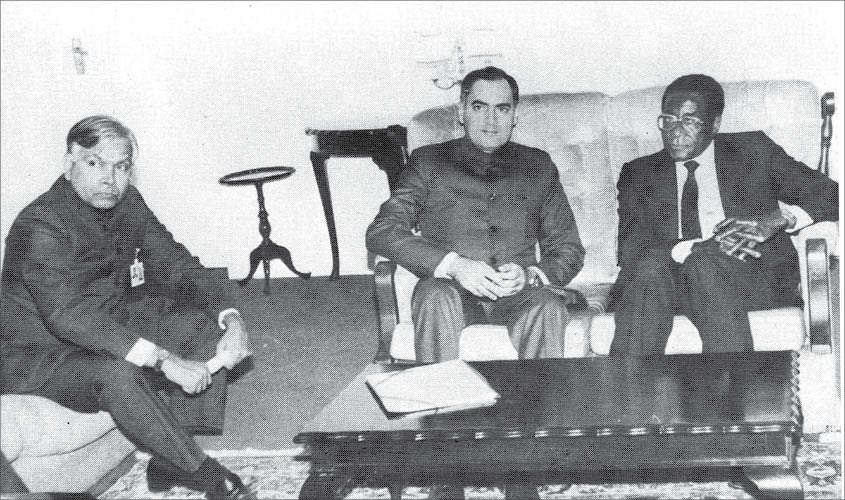Mehta came with encouraging news. Mr Mugabe would receive me at midnight at an undisclosed location.
I first met the late President Robert Gabriel Mugabe born (21 February 1924) in mysterious circumstances in Salisbury (not yet Harare) in February 1980. He had recently won the first ever democratic elections held in Southern Rhodesia, defeating Joshua Nkomo, Mugabe’s senior and head of Zimbabwe African People’s Union. ZAPU. Robert Mugabe was leader of ZANU—Zimbabwe African National Union.
On 24 January 1980, Indira Gandhi took over as Prime Minister for the second time. A couple of days later she telephoned me. I was at the time High Commissioner in Zambia, residing in Lusaka, the capital. She enquired how I was and when I would come to Delhi.
Before leaving for Delhi, I visited Salisbury to get in touch with Prime Minister designate Robert Mugabe. During the elections we had backed the wrong horse, Joshua Nkomo.
Mugabe had been sentenced to 11 years’ imprisonment in 1963. He was released in 1974. Instead of coming to Lusaka, where Oliver Tambo of the African National Congress (Mandela’s Party), Nkomo and Sam Nujoma, later to become President of Namibia, lived in exile—I was in close touch with them—Robert Mugabe chose to live in Beira, the capital of Mozambique, a Portuguese colony located on the coast of the Indian Ocean, south of Tanzania.
Locating Mr Mugabe in Salisbury turned out to be complicated business. We had closed our diplomatic offices in Salisbury in the 1950s. When it became evident that Robert Mugabe would become Prime Minister, we opened an office in Salisbury. We sent Arif Qamrain, IFS, our first secretary in the High Commission in London, to Salisbury. He arrived there on 26 January 1980. Arif had worked under me in Warsaw, when I was ambassador to Poland in the early 1970s.
I asked Arif to arrange my meeting with Robert Mugabe. Easier said than done. Mugabe’s whereabouts were not known. His life was apparently in danger. Arif Qamrain had in a quiet diplomatic way established contact with some leaders of the Indian community. He approached a man called Suman Mehta, an activist and member of Nkomo’s ZAPU. An astute Gujarati, he also had friends in Mugabe’s ZANU. Arif asked Mehta to arrange for me to meet Robert Mugabe. Mehta was cautious. He would try but gave no assurance. All we could do was to cool our heels. Suspense was agonising. Finally, Mehta turned up with encouraging news. Mr Mugabe would receive me at midnight at an undisclosed location. When we finally came in the vicinity of the house where Mugabe was living, Mehta asked Arif to abandon his car. We piled into Mehta’s vehicle. In pitch dark Mehta took a roundabout route to avoid the white policemen. We somehow made it to the great leader’s house. There, in a dim-lit-room, Robert Mugabe was seated on a low chair, wrapped in a blanket—it was a very cold night.
I conveyed to him Prime Minister Indira Gandhi’s good wishes and greetings. Drip by drip my sugared diplomatic platitudes dropped out, praising Mr Mugabe’s valiant struggle against the oppressive racist regime. Mugabe knew only too well that we had backed his rival. His response was polite. He asked me to thank Mrs Gandhi for sending me. I hesitatingly asked whether invitations to heads of state and governments had been sent for the independence celebrations on 18 April. Mr Mugabe said, “All that is being done by the governor.” He was Winston Churchill’s grandson, Sir Christopher Soames, a mid-level Tory.
I had heard in Lusaka that the British did not wish for a prolonged celebration. I cautioned Mr Mugabe and suggested the celebrations should be held in splendour. He agreed. Eighty heads attended the celebration.
Indira Gandhi arrived in Harare on 17 April. I was present at the airport, as were senior ministers of Mr Mugabe’s government.
Prince Charles represented the United Kingdom. The liquidation of the British Empire was ending at a galloping pace. For me it was a singular honour and privilege to be present in Harare on 18 April as a member of Indira Gandhi’s entourage.

